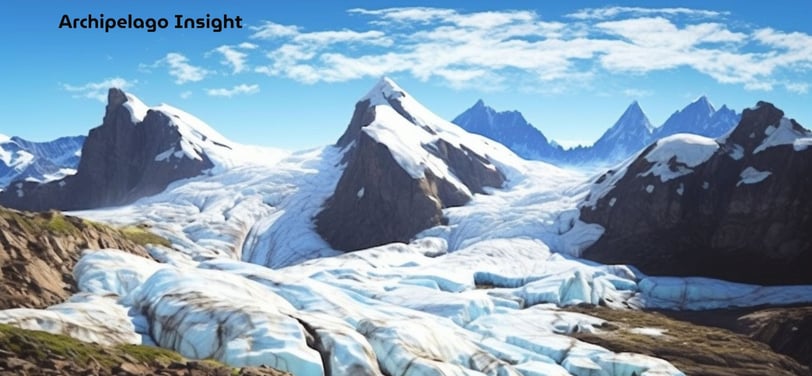Indonesia's Tropical Glaciers at Risk of Extinction
Due to Climate Change and El Niño: Impacts on Ecosystems and Economy.
ENVIRONMENTAL ISSUES
8/26/20233 min read


Due to El Niño, two of the world's few tropical glaciers in Indonesia are vanishing at an alarming rate, and their ice may disappear by 2026 or even sooner. The Eternity Glaciers, which are located in the Jayawijaya highlands in Papua, are particularly susceptible to climate change and are at risk of extinction.
Donaldi Permana, a climate researcher, stated that there was little that could be done to prevent the retreat, and that the event could disrupt the regional ecosystem and cause a rise in the global sea level within a decade. The glaciers' ice loss is accelerating, and they have shrunk substantially in recent years.
According to scientists, precipitation that formerly fell as snow is increasingly falling as rain, which hastens the thawing of ice. The confluence of global warming and El Niño has already led to the breaking of global temperature records in recent months. Indonesia is the world's leading exporter of coal, and more than half of its energy is derived from coal.
The Leading Causes
Several factors contribute to climate change and result in the disappearance of tropical glaciers in Indonesia. Among the primary causes are:
Indonesia has one of the greatest rates of deforestation in the world, with vast swaths of forest cleared for agriculture, logging, and mining. The increase in greenhouse gas emissions caused by deforestation contributes to global warming.
The combustion of fossil fuels such as coal, oil, and gas is a significant contributor to greenhouse gas emissions, which trap heat in the Earth's atmosphere and cause climate change.
Agricultural practices: Indonesia's agricultural sector is a significant source of greenhouse gas emissions, with land fire and livestock production contributing to climate change.
Rapid industrialization in Indonesia has resulted in increased energy consumption and greenhouse gas emissions, both of which contribute to climate change.
As previously stated, the receding of glaciers in Indonesia as a result of rising temperatures is also a major contributor to climate change in the region.
Despite this, Indonesia intends to achieve net-zero emissions by 2060 and has set an ambitious goal of reducing emissions by 31,89% on its own by 2030, or by 43.2% with international assistance.
How Will the Economy of Indonesia Be Affected?
The erosion of tropical glaciers in Papua, Indonesia as a result of climate change can have significant effects on the economy of the country. Major contributors to the economy, agriculture, forestry, and fisheries, are highly sensitive to changes in precipitation patterns and temperature caused by climate change.
This can have detrimental effects on crop yields, animal populations, and forest productivity. Moreover, as a result of climate change, rising sea levels and increased inundation can damage infrastructure and disrupt transportation and commerce, further impacting the economy.
Climate change-related events, such as coral bleaching and natural disasters, can have a negative impact on Indonesia's tourism industry, which is a significant contributor to the country's economy.
Therefore, it is essential for Indonesia to mitigate the effects of climate change on its economy and promote sustainable development.
Take Countermeasures
The significance of the melting of glaciers in Indonesia cannot be exaggerated. Loss of glaciers can have devastating effects on local communities and ecosystems, including changes in water availability, inundation, landslides, and disruptions in agricultural and fisheries production.
Moreover, glacier melting can contribute to sea-level rise, which poses a substantial hazard to coastal communities and economies.
However, the Indonesian government has implemented a number of measures to mitigate the effects of glacier erosion, indicating that it takes this matter seriously. These include the promotion of reforestation, the development of renewable energy sources, and the improvement of water management practices.
The formation of a national council on climate change is also a step in the right direction towards addressing the broader issue of climate change.
Furthermore, particular initiatives such as the establishment of small-scale hydropower plants, water storage facilities, and community-based forest management programs are being launched to minimize deforestation.
International organizations such as the UNDP and World Bank are also assisting Indonesia in devising adaptation strategies and implementing mitigation measures in response to climate change.
Indonesia's efforts to resolve glacier melting and climate change are commendable, despite the fact that there is still much work to be done. It is essential to employ sustainable practices and policies in order to mitigate the effects on local communities and ecosystems.
***
Archipelago Insight, 2023
